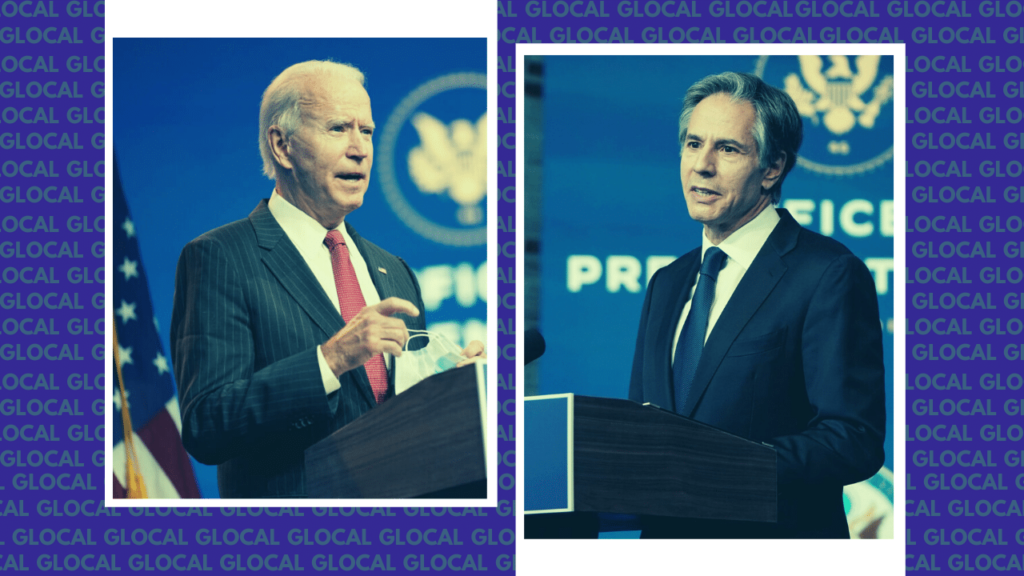

By Andrew Korybko, a Moscow-based American political analyst
President-Elect Joe Biden announced shortly after the election that he’ll seek to have long-time aide Antony Blinken confirmed by the Senate as the US’ next Secretary of State. This selection is highly significant since it hints that America’s next grand strategic move might be to assemble an “alliance of democracies”. The reason for this prediction is that Blinken is reported to be in favor of repairing America’s traditional alliances that were damaged during Trump’s first term, specifically with an intent to focus on those which practice a model of Western democracy.
Financial Times reported that Blinken told an interviewer during a recent podcast that “the US had to rebuild alliances to tackle the ‘democratic recession’ enabled by Mr Trump that let ‘autocracies from Russia to China . . . exploit our difficulties’.” This can be interpreted as an attempt to advance prior proposals for the US to present itself as the global leader of democracy in a world divided between this system of governance and so-called “autocracies”. Considering the fact that many observers already regard the world to be in the midst of a New Cold War between the US and China, “democracies vs. autocracies” might characterize the New Bipolarity.
That’s not to say that this is an accurate reflection of international affairs, but simply to argue that Blinken’s nomination strongly suggests that the US’ next possible Secretary of State probably sees everything through this prism and will accordingly formulate policy based on these views. While many have argued that Biden’s presidency might greatly differ in many respects from his predecessor’s that might actually not be the case if the “alliance of democracies” strategy is pushed forth. Some of Trump’s closest allies such as Poland, Israel, India, and Japan all practice various forms of Western democracy despite some criticism of their methods.
It would interestingly be consistent with Trump’s grand strategy of integrating the US’ system of European, Mideast, and Asian alliances together if Biden were to do so under the guise of assembling an “alliance of democracies” through Blinken. America also has some allies which obviously don’t practice forms of Western democracy, but most of those with few exceptions probably wouldn’t be the focus of its forthcoming foreign policy. In addition, since Biden and Blinken represent the continuation of Obama-era policies, it can’t be discounted the US might seek to apply Color Revolution pressure upon some of them to catalyze reforms.
In practice, an “alliance of democracies” could bring together NATO, the de-facto fusion of Israel and the GCC (despite the latter opposing Western-style democracy at home), and the Quad. This would in effect complete the encirclement of the Eurasian Rimland and put enormous pressure on Russia, Iran, and China respectively. Each corner of this Eurasian triangle could also bolster the other’s efforts as well. For example, the Wall Street Journal reported in late November that the US wants to create an anti-Chinese economic alliance with Europe. This could prospectively expand to include its Mideast and Asian allies too.
Some of the US’ European allies are already militarily active in the Mideast and Asia, and the US’ Asian allies have already stopped purchasing oil from Iran following the US’ “secondary sanctions” pressure, so there’s already some visible synergy between them on these fronts. The prospective “alliance of democracies” might then be leveraged to drive a wedge between the US’ three geostrategic targets, perhaps in the event that Biden returns the US to the Iranian nuclear deal, subsequently lessens or even removes the related unilateral sanctions that were imposed over the past few years, and thus tries to pry Iran away from Russia and China.
Moreover, intense pressure could be put upon the US’ wayward allies like Turkey in order to compel them to distance themselves from Russia, China, and Iran or face potential consequences (likely economic at first) from this new trans-Eurasian bloc. Superficially democratic slogans against Ankara and others could be powerful enough to generate a global information war to intensify pressure campaigns and possibly even provide the plausible pretext for covering up for forthcoming Color Revolution plots. After all, the Obama Administration was known for this strategy, and if Blinken takes the reins at the State Department, then he’ll likely continue it.
Remembering how Trump seemed to be moving in the direction of an “alliance of democracies” over the past four years, the question thus naturally arises of whether the Biden variant of this strategy would really make any meaningful difference. It can be argued that Trump never really cared about whether a partner actually practiced Western democracy or not despite whatever some of his officials might have claimed, but Biden and his team seem to be true believers of this ideology. Their zeal could make them even more decisive than he and his team ever were since they truly believe that “spreading democracy” is good for the world.
Trump was criticized by many for his anti-diplomatic and bombastic statements, but to his credit, he was the first president in several decades not to start a new war during his time in office. This speaks to the pragmatism of his foreign policy, which was mostly transactional in hindsight and only influenced by ideology insofar as it relates to his passionate opposition to globalism. He didn’t, however, resort to militaristic means to impose it upon others, unlike what Biden and his team might end up doing vis-a-vis their “democratic” beliefs. Their possible leadership over an “alliance of democracies” should therefore be seen as a destabilizing development. The return of “pro-democracy” ideologues to power in America could lead to it practicing a more militant foreign policy than it did over the past four years. Moreover, the presence of many Obama-era officials and those who were influenced by them in the incoming Biden Administration hints that the strategy of Color Revolutions might once again be more frequently utilized, all in the name of “spreading democracy”. The cumulative effect of these predicted foreign policy changes will put immense pressure on Russia, China, and Iran, which could in turn contribute to the further destabilization of Eurasia.
Disclaimer: The views expressed in the article are of the author and do not necessarily represent the institute’s policy.

